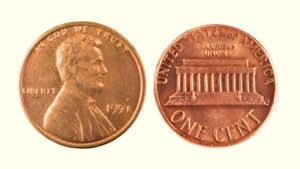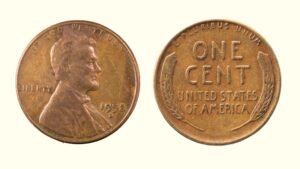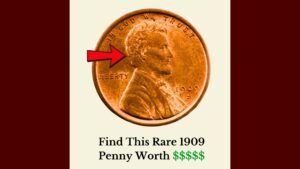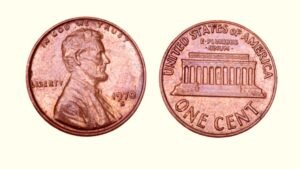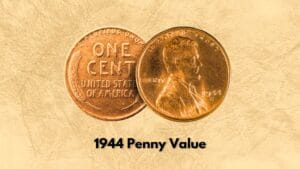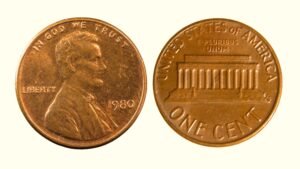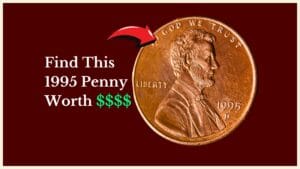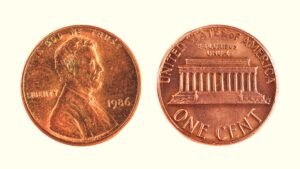Got a collection of old American coins? Look for a 1918 Lincoln penny with wheat reverse now, because this small copper coin is worth a lot today; as much as $78,000! So, scroll down this price guide to learn to recognize rare features like excellent condition, rare mint marks, and errors that can turn an ordinary 1918 copper penny into a gem worth big bucks!
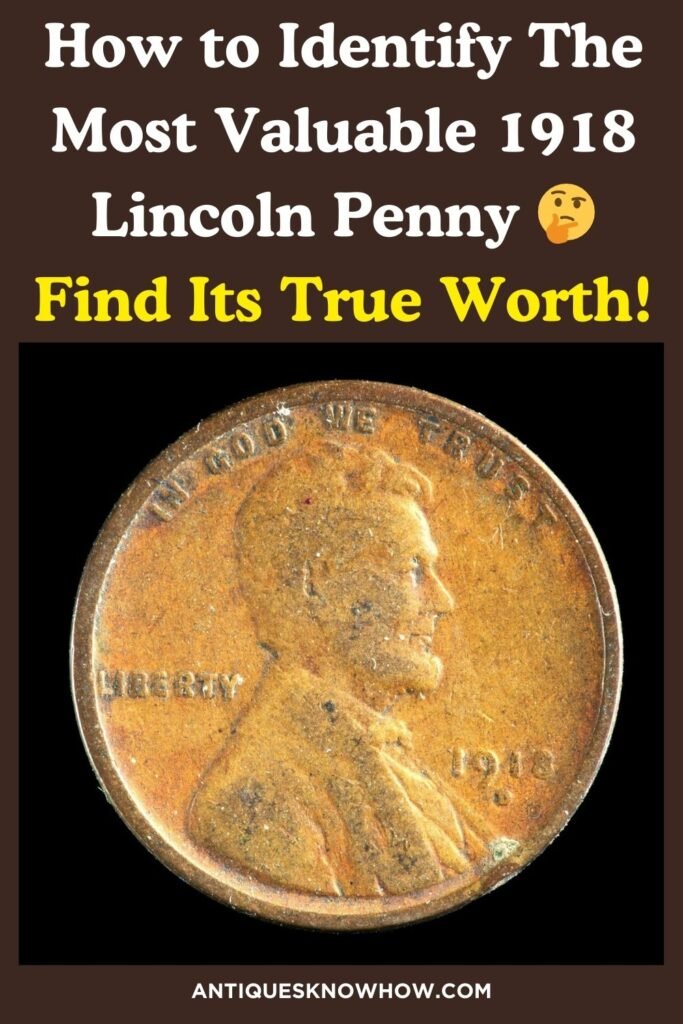
On average, a 1918 Lincoln penny is worth around $0.12 in the circulated state with visible wear and tear. On the other hand, pennies in excellent condition can range from $15 to $78,000, depending on grading, mint marks, and other factors.
Brief History of a 1918 Lincoln Wheat Penny
In 1918, the United States was in the final year of World War I, which significantly impacted coin production and circulation. The Lincoln Penny series, designed by Victor D. Brenner, was in its 10th year of minting.
The relatively high mintage of the 1918 Lincoln cent, especially from Philadelphia, reflects the coin’s rising popularity during wartime. However, finding high-grade examples can be challenging due to heavy circulation and the passage of time. That’s why well-preserved 1918 pennies are highly prized by coin collectors today!
| 1918 Lincoln Penny | Key Features |
| Material Composition | Bronze (95% Copper, 5% Tin & Zinc) |
| Minting Location | Philadelphia, Denver & San Francisco |
| Year of Minting | 1918 |
| Face Value | 0.01$ or 1 Cent |
| Weight | 3.11 grams |
| Diameter | 19 mm |
| Thickness | 1.52 mm |
| Designer | Victor David Brenner |
| Mint Marks | No Mint Mark-Philadelphia D-Denver Mint S-San Francisco Mint |
| Total Mintage (All Mints) | 370,614,634 coins |
Identifying a 1918 Wheat Penny (Design & Physical Features)
To ensure a 1918 Lincoln cent is a real, antique copper coin and not a fake, it’s important to understand the design details and other characteristics.
1918 Lincoln Cent Obverse:
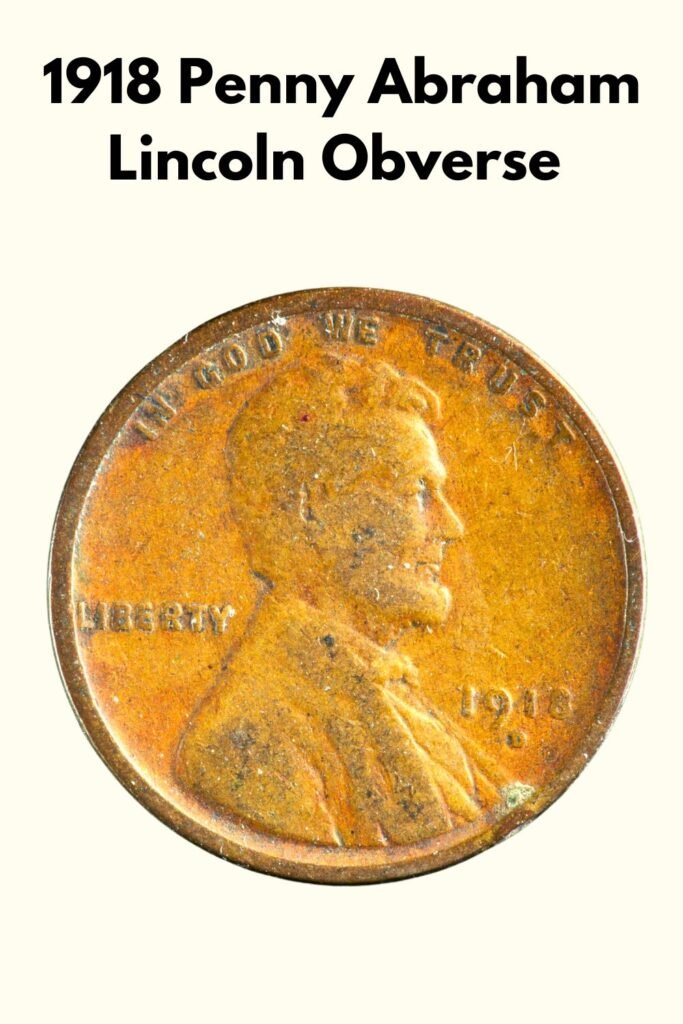
- A right-facing profile of Abraham Lincoln, the 16th U.S. president
- Words ‘IN GOD, WE TRUST,’ above Lincoln’s head
- ‘Liberty’ to Lincoln’s left (back)
- The mint date ‘1918’ to Lincoln’s right, front of his chest
- The mint mark, D or S, if present, below the mint date
1918 Lincoln Cent Reverse:
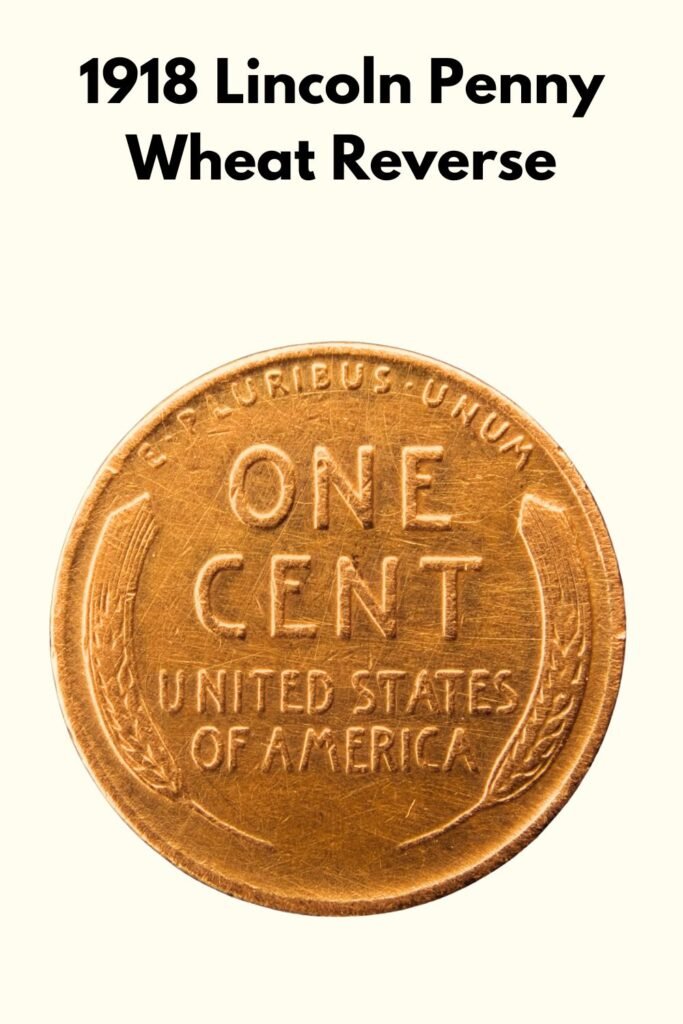
- The denomination ‘ONE CENT’ in the center upper side
- ‘UNITED STATES OF AMERICA’ right below the denomination
- Two wheat stalks surrounding the denomination and nation’s name
- The Latin phrase ‘E. PLURIBUS UNUM’ at the top
Coin Composition and Size Details
Just like its predecessors, the 1918 Lincoln Cent is also composed of bronze alloy with 95% copper and 5% zinc. This composition gives the coin a distinctive weight of 3.11 grams and a unique red-copper color (when new).
As for its size, the small cent has a diameter of 19.05 mm and a thickness of 1.52 mm. Besides, it has a uniform and smooth, non-reeded edge. Understanding these physical characteristics will help you differentiate a real 1918 copper cent from a fake one!
4 Key Factors to Find a 1918 Lincoln Penny Worth
| Coin Grades | 1918 No Mint Mark Penny Value | 1918 D Penny Value | 1918 S Penny Value |
| Poor (0) to Extremely Fine (XF45) | 50 cents to $10 | $5 – $10 | $5 – $10 |
| Almost Uncirculated (AU50) to Mint State (AU58) | $10 – $50 | $50 – $100 | $50 – $150 |
| Mint State (MS60 – MS64) | $50 – $190 | $150 – $2,880 | $220 – $2,580+ |
| Mint State (MS65 – MS66+) | $250 – $1,560+ | $2,000 – $19,200+ | $3,000 – $9,600 (MS65) |
| Mint State (MS67 – MS67+) | $2,300 – $17,625+ | $42,000 – $45,600+ | N/A |
| Mint State (MS68 or Above) | $55,200 – $78,000+ | N/A | N/A |
The real value of an old 1918 Lincoln Wheat Penny depends on various factors such as mint marks, grades, and minting errors. Let’s understand them in detail:
1. Coin Condition & Grades
Coin grades, which are professional designations for a coin’s condition, are the most crucial factor impacting a 1918 penny value. Generally, all coins are graded using a scale from P-1 to MS-70, with higher numbers indicating flawless condition.
The higher the grades, the more expensive a 1918 Lincoln cent. For example, an MS63-graded 1918 1C minted in Philadelphia is worth only around $50 to $70, while the same coin can sell for over $75,000 in MS68 grade.
Remember, while you can assess your coin’s condition by visually checking the details and sharpness, it’s best to get it graded as they’re worth more.
2. Coin Color & Toning
The color of a 1918 copper cent changes due to toning and oxidation over time, impacting its market value and rarity. Basically, there are three color designations for Lincoln cents:
- Red (RD): Red 1918 pennies retain the original luster and vibrant red color. These are the most sought-after and can fetch tens of thousands of dollars in high uncirculated grades.
- Red-Brown (RB): 1918 cents with a mix of red and brown toning are graded RB. They are valued slightly lower, ranging from $30 to $7,500, depending on grades and mint marks.
- Brown (BN): Brown pennies have lost most of their original red color. They are usually valued at $20 to $2,700, based on mint marks and their overall condition.
3. 1918 Lincoln Penny Mint Marks & Mintage
The 1918 Lincoln penny was minted in Philadelphia, Denver, and San Francisco, each with different mint marks and mintages that impact their values:
1918 No Mint Mark Penny Value (Mintage – 288,104,634)
The Philadelphia Mint produced the most 1918 copper pennies, all with no mint mark, which are the most common today. Nonetheless, these can be valuable in higher grades with values ranging from $60 to $75,000 for MS63 to MS68 grades. Circulated 1918 no mint mark pennies are worth 80 cents to $50, depending on condition.
This most expensive 1918 no mint mark Lincoln penny is the graded MS68, which sold for an eye-popping price of $78,000 on Heritage Auctions in 2023!
1918 D Wheat Penny Value (Mintage – 47,830,000)
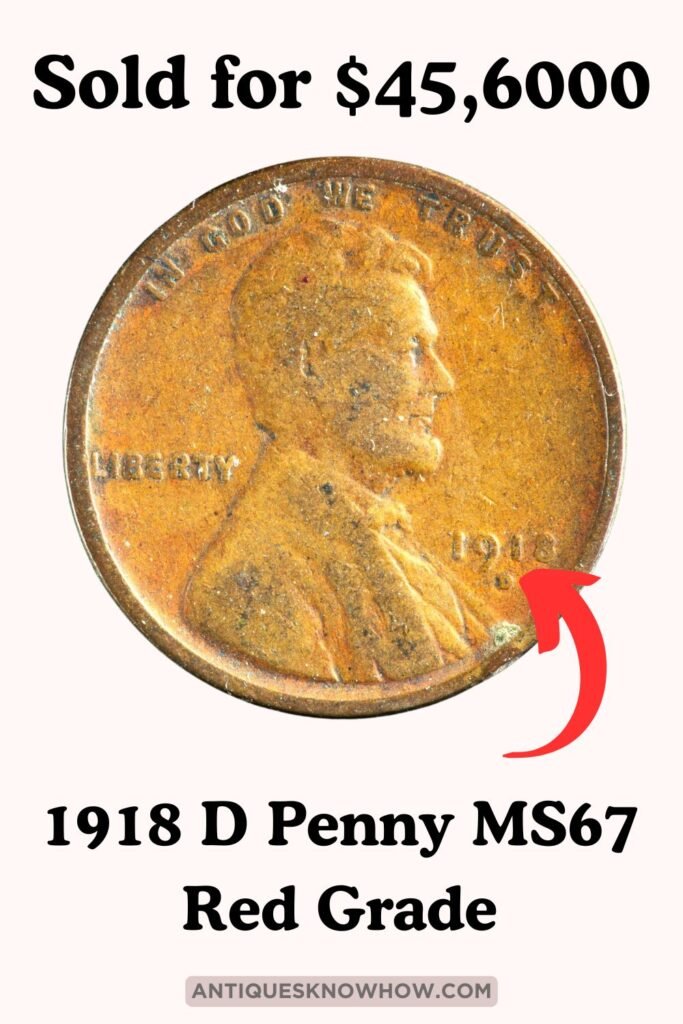
1918 pennies with a “D” mint mark were produced at the Denver Mint and were rarer and generally valued higher due to the lower mintage. In mint state, a 1918 D penny can range from $240 to $45,000 for MS63 to MS67 grades. An MS68 1918 D penny can be worth even more, although none has been graded this high as of now.
1918 S Wheat Penny Value (Mintage – 34,680,000)
The 1918 S Lincoln pennies minted at the San Francisco Mint are the rarest cents due to the lowest mintage of only 34.6+ million coins. The value of a circulated 1918-S wheat penny can be around a few dollars, but mint state coins can fetch $450 to $10,000, depending on coin grades. Due to rarity, these cents are hardly found in grades higher than MS65.
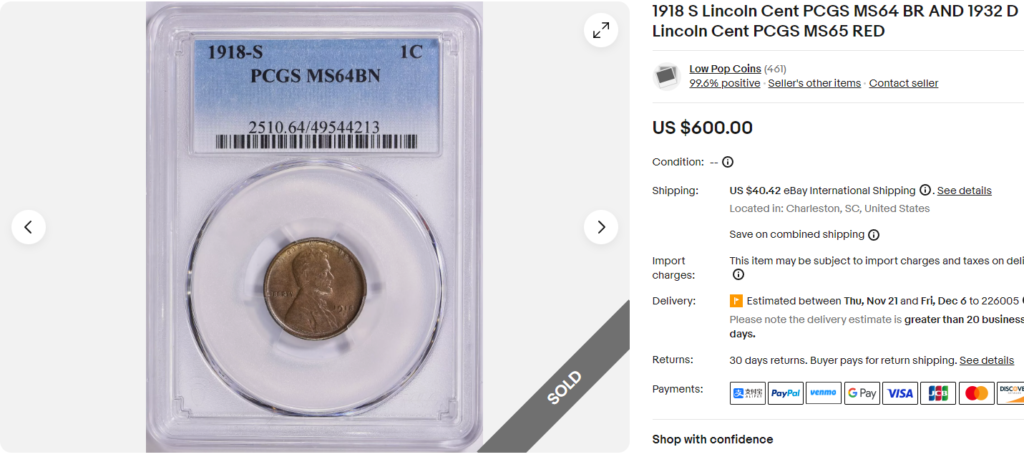
4. Rare 1918 Lincoln Penny Errors
The last important factor influencing your 1918 Lincoln cent value is minting errors or flaws that occur during the striking process. Here are the most valuable 1918 penny errors:
Off-center Strike
This error happens when the 1918 copper cent blank is misaligned during striking and part of the design gets missing, with a blank area on the coin’s either side. The value of the error coin depends on how off-center the strike is, how much of the date is visible, and how persevered the coin is.
Minor off-centers (10-20%) might be worth $20-$50, while severe ones (50% or more off) can fetch $100-$300 or more, especially if the full date is visible. For example, an MS60 1918-S cent Struck 35% off-center sold for over $370 in a coin auction!
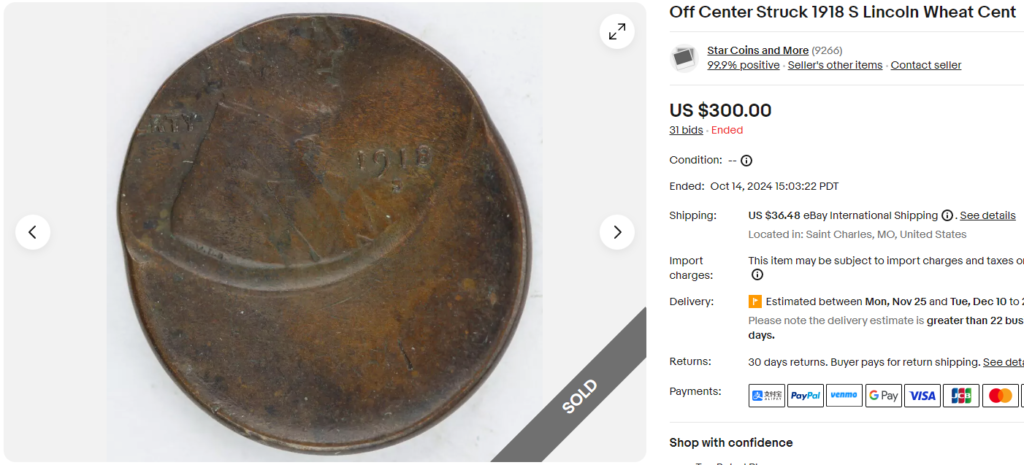
Struck Nine Times
As the name suggests, this rare coin was struck nine times in the die creating nine overlapping images of the Lincoln design all in different angles. To spot it, To identify, look for heavily distorted and overlapping design elements.
The only 1918 1C Struck Nine Times graded yet was sold for $2,070 on Heritage Auctions for a Fine-15 grade, which is an exceptional price for a regular F-15 grade 1918 penny; it’s generally worth only a few cents.
Curved Clip (Clipped Planchet) Error
This error occurs during the blanking process, resulting in a smooth, curved absence of metal on the 1918 penny coin’s edge. Look for a crescent-shaped cut-out on the coin’s rim to spot it.
The value of this coin ranges from $20 to $100, depending on the size and location of the clip and the coin’s condition. For example, an MS64 1918 penny with a 10% curved clip sold for almost $50 on eBay. The value of this particular coin is low because the mint date is not visible.
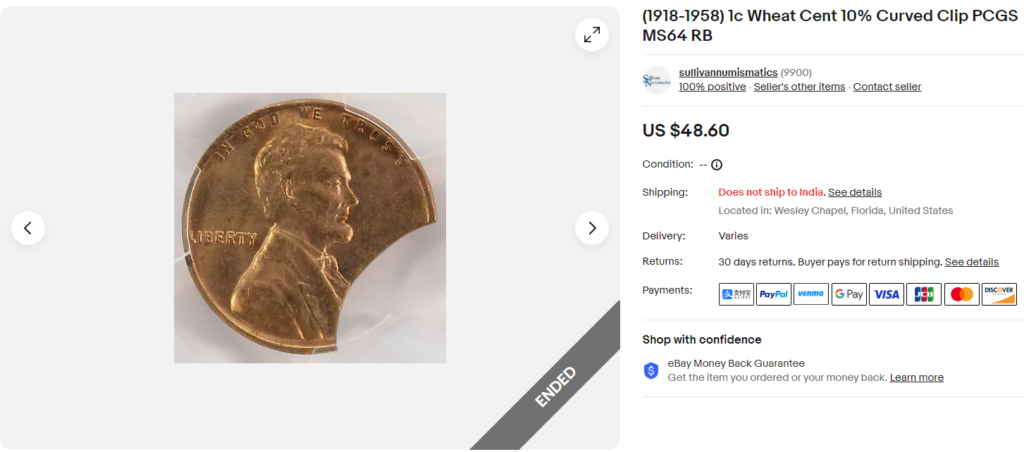
In addition to these, a 1918 Lincoln wheat cent can also exhibit common minting errors, such as the double die error, repunched mint mark errors, and major/minor cud or die break errors. While not many examples of these errors have been discovered yet, they can be valuable if found.
Note: This article is intended for informational, educational, and entertainment purposes only. Some images are illustrative and may not represent actual brands, products, or related entities. All trademarks, product names, brand logos, packaging, and other intellectual property referenced remain the exclusive property of their respective owners. Any brand mentions or references are provided solely for descriptive and educational context and do not imply any formal or commercial association.


